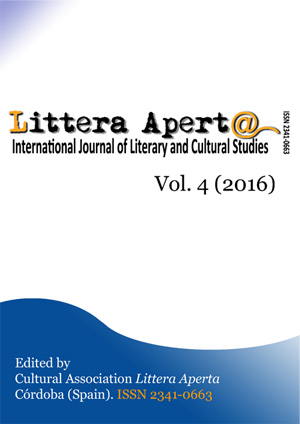La ninfa Cilene en "The trackers of oxyrhynchus" de Tony Harrison
Contenido principal del artículo
Resumen
La obra teatral The Trackers of Oxyrhynchus de Tony Harrison, elegida como una de las 100 mejores obras de teatro del siglo XX por el National Theatre Millennium Poll, representa el deseo de revivir el género del drama satírico, del que apenas se conservan ejemplares en comparación con las tragedias clásicas. The Trackers of Oxrychynchus es una reelaboración de los fragmentos papiráceos encontrados del drama satírico Ichneutae (“rastreadores”) de Sófocles, basado, a su vez, en el himno homérico a Hermes. En este artículo nos proponemos analizar la versión de Tony Harrison representada en Delfos (1988) centrándonos en el personaje de Cilene, una ninfa que, a pesar de no aparecer en el himno homérico y de no desempeñar un papel protagonista ni en el hipotexto de Sófocles ni en The Trackers of Oxyrhynchus, representa un marcado contraste teatral con los sátiros, quienes, podríamos decir, son los personajes principales del drama satírico de Sófocles y de Tony Harrison. En este artículo analizaremos, pues, el personaje de Cilene y los elementos que han pervivido o han sido modificados en la versión de Tony Harrison. Por último, exploraremos las razones de esas reelaboraciones y propondremos una interpretación crítica de la obra.
Descargas
Los datos de descargas todavía no están disponibles.
Detalles del artículo
Sección
Artículos
Authors who publish with Littera Aperta agree to the following terms:
- Authors retain copyright and grant the journal right of first publication with the work simultaneously licensed under a Creative Commons Attribution 4.0 International License that allows others to share the work with an acknowledgement of the work's authorship and initial publication in this journal.
- Authors are able to enter into separate, additional contractual arrangements for the non-exclusive distribution of the journal's published version of the work (e.g., post it to an institutional repository or publish it in a book), with an acknowledgement of its initial publication in this journal.
- Authors are permitted and encouraged to post their work online (e.g., in institutional repositories or on their website) prior to and during the submission process, as it can lead to productive exchanges, as well as earlier and greater citation of published work (see The Effect of Open Access).
